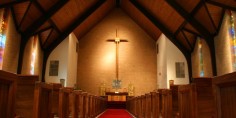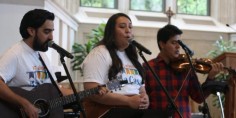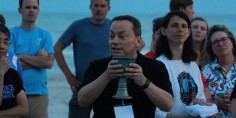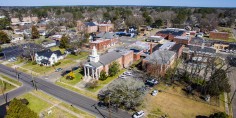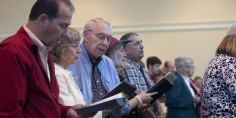In communities across the country, African American clergy have been especially stressed by the pandemic and its effects on their congregations. Many Black churches are struggling to meet their financial obligations, and anxiety among members has placed extra strain on pastors and church lay leaders. The disproportionate death rate among African Americans, including those serving the church, has taken a deep emotional toll.
In North Carolina, a five-week well-being program is helping clergy address those stressors. Offered through an independent outreach ministry called Peletah Ministries, the curriculum is designed to foster emotional and spiritual care for clergy of color.
Two $100,000 grants from The Duke Endowment are supporting the work. The first award helped Peletah launch the program for African American pastors and lay leaders in six coastal counties earlier this year. The Endowment’s second grant in November allowed Peletah to offer additional sessions for clergy on the waitlist.
“When we had 98 percent of participants in the first group saying they were going to recommend this program, we realized this is something that’s very much needed,” says Peletah’s executive director, the Rev. Dr. Dawn Baldwin Gibson.
Outreach and Service
Based in New Bern, N.C., Peletah Ministries focuses on outreach in some of the state’s most rural coastal counties.
Dawn Gibson and her husband, Anthony, are the co-pastors. Dawn co-chairs the North Carolina Inclusive Disaster Recovery Network’s African American Council and is recognized as a leader in disaster response. Anthony has worked in the field of mental health for more than 30 years.
“We’re a small body of believers working to help people in marginalized communities get the resources they need to build resilience,” Dawn Gibson says. “We want to be the Lord’s hands and feet on Earth.”
Their program for clergy uses the image of a shell to symbolize protection and comfort. SHELL’s curriculum covers:
- Safety: assess and enhance emotional safety and comfort.
- Hope: promote and facilitate hope-filled mindfulness.
- Efficacy: promote and enhance positive self-efficacy.
- Lasting: build resilient skills.
- Links: provide additional links and referrals to support continued well-being.
Peletah uses a licensed, culturally competent clinician to deliver the content, which is then put in a theological framework by members of the ministry staff. A registered dietician and two case workers complete the team.
If services are needed beyond the program’s scope, Peletah has relationships with mental health providers, departments of social services and physicians.
Safe Place to Heal
The Gibsons developed the program in 2018 (and it was copyrighted in 2019) when Hurricane Florence devastated eastern North Carolina with its high winds and record-breaking rains. As they began to rebuild, many people in the community struggled to attend to their emotional, physical and spiritual needs.
After witnessing some of the same challenges among clergy during the early days of COVID, the couple updated the program and restructured it specifically for pastors.
“The level of impact that the pandemic is having in African American communities is unquestionably severe,” Dawn Gibson says. “The people are shouldering it, no doubt, but so are the pastors. They are first-line responders, called when anything happens. Black pastors play a critical role in their communities, and much weight comes with that.”
SHELL is designed to provide a safe space for pastors to heal during challenging times, and a wellness plan for building long-term resiliency.
For example, with the theological base of Hebrews 13:6 — “So we say with confidence, the Lord is my helper; I will not be afraid. What can mere mortals do to me?” — participants examine what safety looks like. They’re asked to ponder what makes them feel safe or unsafe as it relates to their health, spiritual or emotional well-being, and then consider how they can build that safety daily.
Each class includes a check-in about sleep, diet and exercise. At the program’s end, clergy are asked to think about their support system and whom they would call in a crisis.
Early Results
Twenty-five African American pastors and church leaders participated in SHELL’s first group. Facing a waitlist, Peletah expanded the second cohort to 40. The third group, which already has a waitlist, will serve 35.
Peletah is starting three-month check-ins for Cohort I and one-month check-ins for Cohort II — and preliminary results are promising. Using pre- and post-intervention testing, graduates reported decreased anxiety, loneliness and depression, along with a better understanding of how and where to seek additional resources. Many said they are practicing the techniques taught to address stress and anxiety.
“Some people are calling this ‘life changing,’” Dawn Gibson says. “And many are telling us they didn’t even know how much it was needed.”


